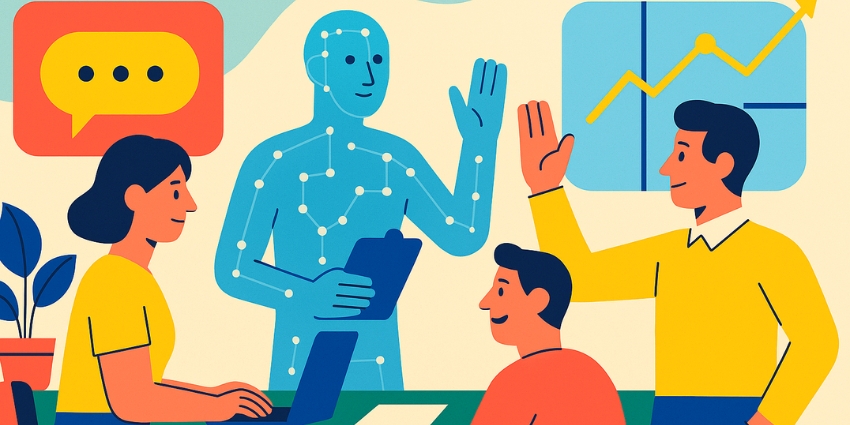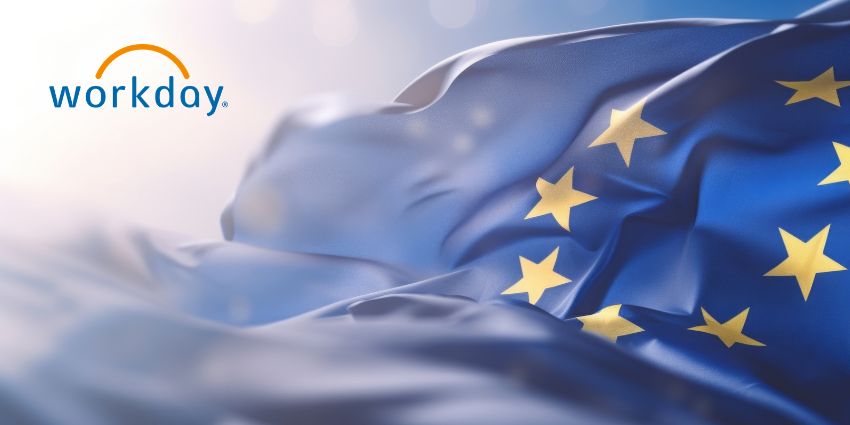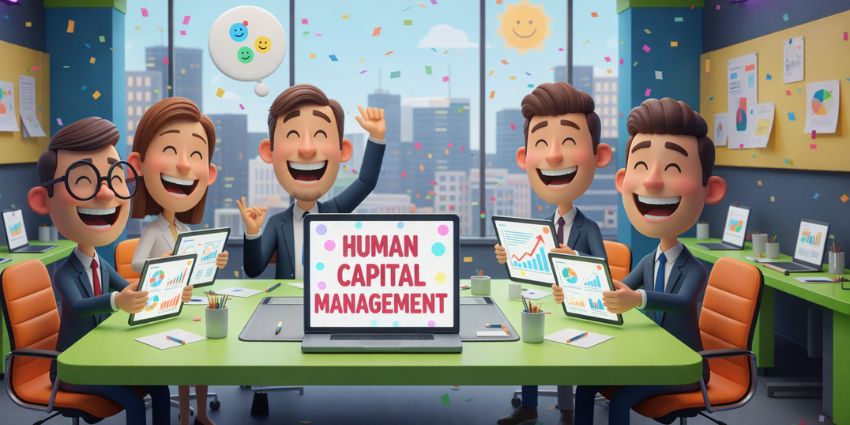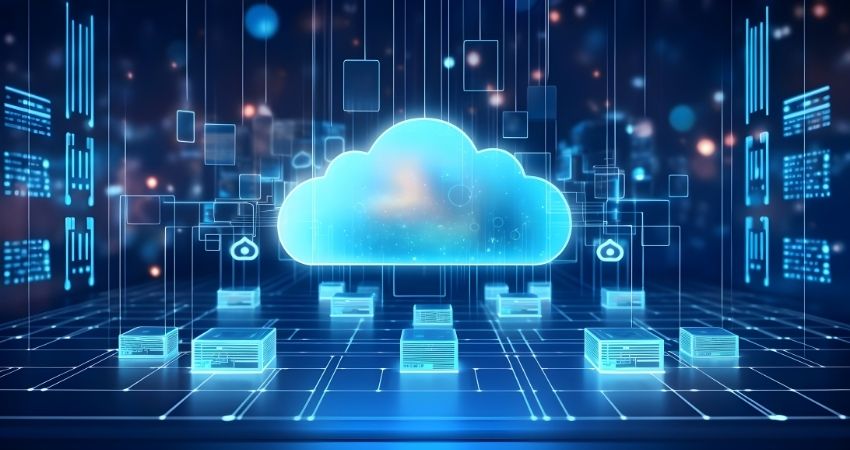AI has moved from HR’s horizon to its heartbeat. For enterprises navigating hybrid work, talent scarcity, and rising expectations for personalisation, AI and automation in human capital management (HCM) have become strategic pivots — transforming how organisations understand, support, and enable their people.
Modern HCM is no longer just about records and reporting. The shift is toward predictive people intelligence: using data to anticipate workforce risks, identify skills gaps early, and improve employee experience at scale.
From Administration to Anticipation
A decade ago, HR systems were built to record events: who joined, who left, and what they earned. Today’s HCM platforms increasingly use AI to shift HR from administration to anticipation.
These models analyse workforce signals such as performance, engagement, and (in some cases) sentiment to forecast:
- Flight risk (who may be likely to leave)
- Skills shortages (where capability gaps are emerging)
- Intervention opportunities (what actions may reduce churn and improve performance)
HR analyst Nadeem Khan emphasises the importance of analytics and automation in human capital management:
“HR will not be replaced by data analytics, but HR who do not use data and analytics will be replaced by those who do.”
In practice, vendors are leaning into skills and risk modelling. For example, Workday has positioned skills intelligence as a core layer for understanding workforce capability, while Oracle Cloud HCM promotes AI-driven insights for workforce planning and retention. The value is simple: predictive insight can reduce recruitment cost, protect institutional knowledge, and support healthier workforce decisions.
Josh Bersin frames the shift bluntly:
“AI must be applied to HR to ensure organizations and employees remain competitive and productive.”
Automating the Mundane, Elevating the Meaningful
AI’s biggest gift to HR is time. By automating routine processes — onboarding, payroll, compliance, scheduling, and employee changes — HR teams can spend less energy on bureaucracy and more on strategy, culture, and capability.
Automation now runs through the employee lifecycle. A new hire can experience a smoother onboarding journey (contract signing, equipment provisioning, access requests, and training recommendations) triggered by workflow logic — while still feeling personally supported.
Platforms like SAP SuccessFactors position automation as cross-department orchestration: when an employee changes role, workflows can trigger updates to compensation, reporting lines, access permissions, and learning requirements. The outcome is faster execution, better accuracy, lower compliance risk, and stronger employee experience.
Personalising Employee Experience at Scale
The next frontier of workforce AI is personalisation. Employees increasingly expect tailored digital experiences at work — similar to consumer platforms. In HCM, this shows up through adaptive learning and talent systems that recommend:
- Courses and micro-learning modules
- Mentors and peer connections
- Internal roles, gigs, and career pathways
Learning experience platforms (LXPs) such as Degreed and talent development tools such as Cornerstone use recommendation algorithms to align development with skills, role needs, and career trajectory. The goal is not “more learning content” — it’s faster, more relevant capability-building that supports retention.
Intelligent Insights, Human Decisions
Modern HCM dashboards increasingly unify signals across performance, engagement, and wellbeing. That matters because workforce decisions often fail when data is fragmented or delayed.
Tools like HiBob and Deel promote people analytics designed for distributed teams — surfacing trends in engagement, collaboration, and workforce health. The win here is not just visibility; it’s earlier intervention.
Some organisations take it further with AI career guidance. For example, IBM has explored AI-driven coaching concepts to support internal mobility and development. The broader lesson: when employees feel supported and “seen” by their systems (and leaders), they’re more likely to stay engaged.
Automation Meets Empathy
The best implementations treat automation as an amplifier of empathy, not a replacement for human judgement. AI can process complex workforce data at speed — but it’s still leaders who interpret, contextualise, and act.
Deloitte has reported workforce sentiment shifts around AI, but the key takeaway is practical: the organisations winning with AI aren’t automating the most — they’re balancing automation with purpose, governance, and trust.
One strong pattern: using data to reduce harm. For example, in hybrid environments, analysis of collaboration behaviours can help leaders spot overload and meeting fatigue. Used responsibly, workforce intelligence can support healthier work design — not just efficiency.
Future-Proofing Through Foresight
The real impact of AI and automation in HCM isn’t faster forms or fancier dashboards. It’s foresight. As skills decay faster than ever, predictive modelling helps enterprises plan capability before gaps become crises.
Generative AI is also pushing HCM toward real-time support: drafting structured performance feedback, simplifying policy communication, creating learning recommendations, and accelerating workforce planning workflows. Many major HCM vendors are already embedding copilots into their suites — shifting HR closer to a continuous, data-supported partner in growth.
IBM Institute for Business Value (IBV) has projected rapid adoption:
“By 2027, the majority of HR professionals will be augmenting their employees with advanced AI tools, and some will even be experimenting with fully autonomous automation.”
AI and automation are reframing what it means to manage people. They can enable faster decisions, fairer processes, and richer experiences — but their true power is helping humans thrive. The future of workforce intelligence won’t be built on algorithms alone; it will be built on trust, transparency, and the belief that technology should serve potential, not replace it.
AI in Human Capital Management FAQs
How is AI used in human capital management (HCM)?
AI in HCM is used to automate workflows (onboarding, payroll, compliance), analyse workforce data, and generate predictive insights such as attrition risk, skills gaps, and workforce planning recommendations.
What are the main benefits of AI in HR and HCM?
The main benefits are time savings through automation, improved workforce planning through predictive analytics, better employee experience through personalisation, and faster, more consistent decision-making.
Can AI predict employee attrition?
AI can estimate attrition risk by analysing patterns in workforce data (performance trends, engagement signals, role changes, tenure, and other variables). It should be used as a decision support tool — not as an automatic judgement system.
What is the difference between automation and AI in HCM?
Automation executes repeatable workflows (like onboarding tasks or policy triggers). AI analyses data to surface insights, recommendations, or predictions — and may also power more adaptive automation.
What are the risks of using AI in HCM?
Key risks include bias in models, lack of transparency, privacy concerns, and over-reliance on automated recommendations. Strong governance, consent, and human oversight are essential.
Discover everything you need to know to turn your workforce into a human powerhouse.







